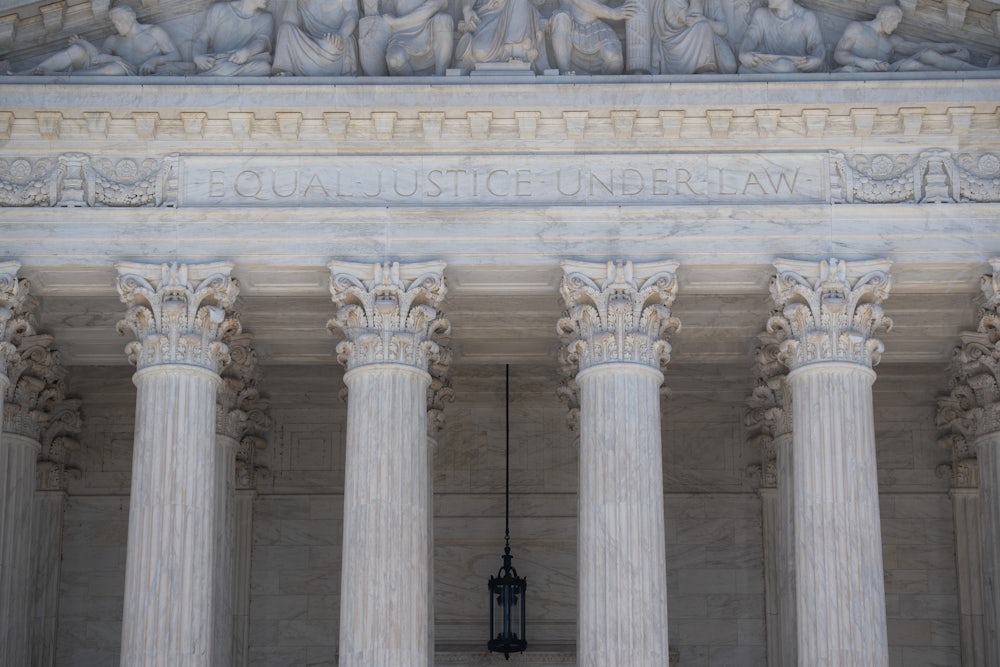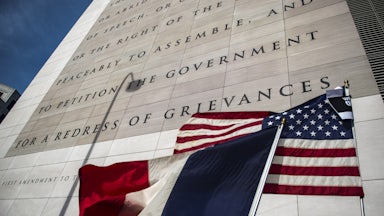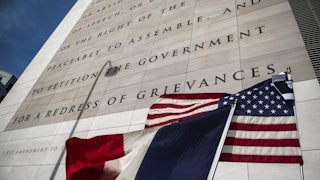When can school boards, state legislatures, and other elected bodies discipline their own members? Does a resolution to censure one of those members violate the First Amendment? Those questions bedeviled the justices on Tuesday morning when they heard oral arguments in Houston Community College System v. Wilson. At issue in the case itself was whether the HCC board of trustees had violated former member Dave Wilson’s free speech rights by subjecting him to censure in 2018. How the court resolves what might have otherwise been a minor local politics spat could go far beyond Texas, potentially bringing fraught and unexpected change to how American elected bodies govern and punish their own.
The underlying dispute in the case dates back to 2013, the beginning of Wilson’s tenure on the board of trustees. Wilson, a conservative Republican, had carved out a reputation in local politics primarily for making controversial and homophobic statements. The board told the court that, after his election, Wilson “filed multiple lawsuits against the HCC, helped others to file additional lawsuits, was accused of leaking confidential information, publicly denigrated the HCC’s anti-discrimination policy, and sparked media attention for a laundry list of other controversies.” Wilson countered that he had identified genuine mismanagement problems with the board; in some instances, he appeared to be correct.
But as the imbroglio roiled on, the board determined that Wilson’s disruptive actions stood to imperil the college’s accreditation. In 2018, Wilson’s colleagues voted to formally censure him. They also imposed three penalties on him: He could not serve as an officer on the board for the next year, spend any board funds, or receive any reimbursement for his travel expenses. Wilson, true to form, sued the board over the censure motion, arguing that it had violated his First Amendment rights to free speech.
A Fifth Circuit Court of Appeals panel rejected Wilson’s claims when it came to the three penalties, ruling that the board had not deprived him of anything he had been guaranteed by law. But it sided with him on his First Amendment claim, concluding it had a chilling effect on Wilson’s protected speech. Judge W. Eugene Davis, writing for the panel and quoting from earlier precedent, noted that “the role that elected officials play in our society makes it all the more imperative that they be allowed freely to express themselves on matters of current public importance.”
As I wrote back in April, the panel’s ruling appeared to conflate public criticism by a government body with a genuine free speech restriction. Its reasoning was all the more striking because the panel had upheld the substantive penalties that the board imposed on Wilson, while also ruling the symbolic penalty to be a First Amendment violation. After the rest of the Fifth Circuit deadlocked on whether to rehear the case, the board urged the justices to overturn it earlier this year.
Richard Morris, who argued on behalf of the board, told the justices at oral arguments that the Fifth Circuit had disregarded “this country’s history and parliamentary tradition which recognized the right of elected bodies to govern their own affairs, including censuring members for violations of governance rules.” He also claimed that the panel had misread the First Amendment, arguing that it “undeniably protects a member’s right to criticize the body upon which they sit, but it does not insulate the member from the elected body’s speech in response.”
The justices appeared sympathetic to the historical argument and reluctant to rule that elected bodies could not censure their own members. But they questioned Morris and the other lawyers on how far elected bodies could go beyond that. “Where is the line between, well, of course, you can censure somebody versus, well, no, you can’t put somebody in jail for stating an unpopular opinion?” Justice Elena Kagan asked.
A complicating factor for some of the justices, and a simplifying one for others, was how this case had reached them. Since the Fifth Circuit panel had upheld the other punishments imposed on Wilson, the board only asked the Supreme Court to review the First Amendment ruling on the censure itself. In his response to the board’s petition earlier this year, Wilson didn’t ask the justices to reconsider whether the other punishments were constitutional as well. “I thought the issue—all we had to decide was a mere censure does not trigger a [First Amendment] retaliation claim,” Justice Brett Kavanaugh asked at one point. “And I think it’ll be difficult, potentially, to draw lines beyond that for the reasons the questions have raised.”
But that didn’t stop other justices from inquiring about the implications for other types of punishment. Does the First Amendment apply when elected bodies expel a member, Justice Clarence Thomas asked? No, Morris replied, though he suggested other parts of the Constitution and common law might constrain it. Justices Elena Kagan and Amy Coney Barrett asked whether elected bodies could jail their own members. Morris suggested that such a move might fall outside “the history and tradition of this country,” but appeared reluctant to expand further.
The hypotheticals did not abate as the arguments went on. What about administrative agencies with multimember boards and courts with multiple judges, Justice Samuel Alito asked? Should they be treated differently from legislative bodies in this context? “As far as history goes, yes, because we do have a historical tradition of elected legislative bodies exercising discipline over their members,” Sopan Joshi, a Justice Department lawyer who argued on behalf of the federal government in the board’s favor, replied.
In an exchange with Michael Kimberly, who argued on behalf of Wilson, Barrett hypothesized how Wilson’s preferred outcome would affect a hypothetical racist legislator. “The member says all kinds of horrible racial slurs on the floor, that is censurable,” she asked, “and then walks out onto the steps and gives a press conference and repeats those exact same racial slurs, that is not subject to censure ever?” Kimberly said that her example would be correct but argued that the legislature could adopt a resolution that praises diversity measures, as HCC’s board recently did, without running afoul of the First Amendment.
Chief Justice John Roberts jumped in to challenge that approach to the question. “That seems to me a very artificial distinction,” he noted. “So, under your view, the Board could say everything it said in the resolution, except at the end say, ‘We would adopt a resolution of censure but for that crazy Supreme Court decision in the Houston Community College System, which said we can’t do that.’” Kimberly said that would be acceptable because it would be nondisciplinary. But that conclusion, Roberts noted, tried to get the court to consider issues beyond the censure itself, which is all that the court agreed to consider when it took up the case.
The basic question here—whether a local community college board can censure one of its rogue members—is far less mundane than it sounds. Censure is a routine tool used by virtually every elected body in the United States, ranging from the House of Representatives and the Senate to hundreds of state legislatures and city councils, and even to the thousands of local school boards, county commissions, and other elected governing bodies that use Robert’s Rules of Order (no relation to the chief justice) to carry out their functions. In their petition, the board claimed that an American elected body issues a censure to one of its members once every two days, on average.
“I mean, it’s a question of the political organization of the United States,” Justice Stephen Breyer noted at one point. “There are legislatures, there are committees, there are state governments, and we are a court, which is just part of it. We don’t run it. And since we don’t run it, the other parties also have to have some powers, and one of the powers typically is power of administration, power to control the kinds of things others say within the body, what’s appropriate, what isn’t.”
Roberts also questioned whether a ruling in Wilson’s favor would open the floodgates to hundreds of censure-related lawsuits every year. “It seems to me once that remedy becomes widely known and available, it would become automatic because, otherwise, it would seem as if you’re accepting the factual recitation in the resolution,” he noted. “And so the traditional legislative-body debates would all end up in court, and then the court would have to decide an essentially political question that divided the members of the board.” With characteristic understatement, Roberts noted that that might be an “unsatisfactory result.”
What result will the court reach instead? The justices appeared generally reluctant to embrace Wilson’s theory and drag themselves into dozens of local-politics squabbles. At the same time, they also seemed hesitant to issue a ruling that would place all sanctions and punishments beyond judicial scrutiny. A more narrow decision that upholds the censure at hand and punts on the other hypotheticals is possible. The Supreme Court’s rules do not give the justices any power to censure or punish one another, so if they disagree on the outcome, they’ll have to spell it out in concurring and dissenting opinions in a written ruling before the end of the annual term next June.










